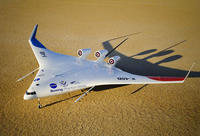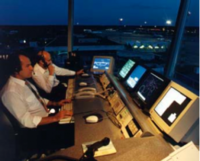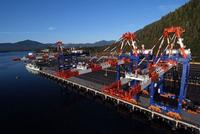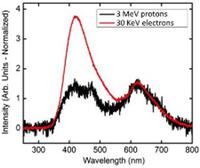-
Futuristic blended wing body aircraft passes flight test

Boeing took another step forward in exploring a revolutionary concept — the blended wing body (BWB) — which one day could offer breakthroughs in flight; the X-48B, an unmanned research aircraft which is a scale model of a heavy-lift, subsonic vehicle that forgoes the conventional tube-and-wing airplane design in favor of a triangular aircraft that effectively merges the vehicle’s wing and body, proved during a flight test program that a BWB aircraft can be controlled as effectively as a conventional tube-and-wing aircraft during takeoffs and landings, as well as in other low-speed segments of the flight regime
-
-
Radiation detection equipment installed in four Mexican ports
The Megaports Initiative is a U.S. Department of Energy program intended to enhance the ability of ports around the world to detect and interdict illicit shipments of special nuclear and other radioactive materials; Under the initiative, radiation detection gear and protocols were implemented in the Mexican ports of Manzanillo, Altamira, Lazaro Cardenas, and Veracruz, through which 92 percent of Mexico’s containerized cargo pass
-
-
Men in maritime disasters save themselves first --“women and children first” is a myth

Since the sinking of the Titanic, there has been a widespread belief that the social norm of “women and children first” gives women a survival advantage over men in maritime disasters, and that captains and crew members give priority to passengers; a new study find that the Titanic disaster, in which 70 percent of the women and children on board were saved compared to 20 percent of the men, is a glaring exception to the rule; during maritime disasters, men use their relative strength to save themselves; what is more, studies of human behavior during natural disasters show the same results: in life-and-death situations, it is every man for himself
-
-
Global air control system largely defenseless against hacking

The ADS-b system, the multi-billion dollar communication system deployed at airports around the world over the last few years, has two major flaws: first, it has no means of verifying who is actually sending a message, which means that a hacker can impersonate an aircraft and send malicious and misleading information to control towers and to other aircraft; second, the position, velocity, and other information broadcast by aircraft is not encrypted and can be grabbed from the air; a presenter at the Black Hat cybersecurity event showed how it is possible to use the information to plot the route of Air Force Phone on an iPad; these two vulnerabilities can be easily exploited by anyone with modest technical skills and about $2,000 worth of electronics
-
-
U.S. agency critical of Canadian ports' security

The U.S. Federal Maritime Commission has issued a report criticizing Canadian sea ports for lax security. The commission reports singled out Prince Rupert port in British Columbia as an especially egregious case of insufficient security for U.S.-bound cargo
-
-
Northrop Grumman delivers Nationwide AIS to Coast Guard
Northrop Grumman has delivered its Nationwide Automatic Identification System (AIS) to the Coast Guard; the system provides a more comprehensive view of vessels bound for and navigating within U.S. ports and waterways
-
-
Bill to tighten admission procedures to flight schools
A bill would require flight schools to check students, including U.S. citizens, against the terrorist watch list before they can be trained to fly aircraft of 12,500 pounds or more
-
-
Bulgaria bus bombing underscores vulnerability of public transport: MTI experts
The Mineta Transportation Institute’s (MTI) Database on Terrorist and Serious Criminal Attacks Against Public Surface Transportation records 3,159 attacks against public surface transportation between January 1970 and January 2012, in which 7,997 people were killed and 30,046 were injured; of these attacks, 47.4 percent were against buses, bus stations, and bus stops; they accounted for 55 percent of the fatalities and 41 percent of the injuries resulting from terrorist attacks during this period
-
-
ONR sensor and software suite tracks, hunts down more than 600 suspect boats
A new sensor and software suite sponsored by the Office of Naval Research recently returned from West Africa after helping partner nations track and identify target vessels of interest as part of an international maritime security operation
-
-
Looking at planes with bird's eye could cut collisions with aircraft
Aircraft collisions with wildlife — primarily birds — is a serious and growing threat to civil and military aviation, as well as an expensive one: bird strikes cost civil aviation alone more than $1.2 billion a year world-wide
-
-
More effective radiation detection of cargo, baggage

A new technique for radiation detection that could make radiation detection in cargo and baggage more effective and less costly for homeland security inspectors; the novel detection method relies on spectral shape discrimination (SSD), taking advantage of a new class of nanoporous materials known as metal-organic frameworks (MOFs)
-
-
Exploring the Bermuda Triangle's swirling vortices

Researchers, funded by the Office of Naval Research, deployed twenty-one underwater probes to study vortices at the Bermuda Triangle; a vortex is a swirl of water that can be created in several ways, including water being pushed between land masses and then released into the open ocean; the oceanographers did well to lose only one of the underwater probes, considering they were studying the notorious Triangle
-
-
The complexities of the human face: analyzing facial recognition technologies in unconstrained environments
Chris Archer, the online content editor at IDGA (the Institute for Defense & Government Advancement), talked with Thirimachos Bourlai, research assistant professor at West Virginia University, about facial recognition technologies; the human face has several advantages over other biometric traits: it is non-intrusive, understandable, and can be captured in a covert manner at variable standoff distances; Bourlai examines the various challenges of facial recognition as a biometric technology faces; defines “unconstrained recognition” and how this challenge is being met; he also explores how facial recognition will be used by the military and commercially in the short and long term future
-
-
Airport security screening technology market to grow
In 2011, TSA distributed approximately $437.1 million in contract obligations toward airport screening technologies; this amount is likely to grow in coming years as airport security authorities look for technology which would allow them to balance the requirements of tight security, on the one hand, and demands from the public for faster and less intrusive screening measures
-
-
New side mirror eliminates blind spot for drivers

A side mirror that eliminates the dangerous “blind spot” for drivers has now received a U.S. patent; the subtly curved mirror dramatically increases the field of view with minimal distortion
-
More headlines
The long view
New Technology is Keeping the Skies Safe
DHS S&T Baggage, Cargo, and People Screening (BCP) Program develops state-of-the-art screening solutions to help secure airspace, communities, and borders
